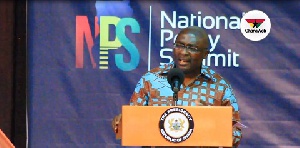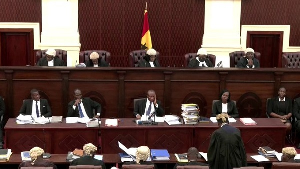Seventy per cent of all projects funded with the tax payers money would be awarded to local firms to execute.
This novel policy forms part of government agenda to grow the private sector and to make them competitive in a growing global environment.
Vice-President Dr Mahamudu Bawumia, who made this announcement when he represented the President, Nana Addo, at the opening of a two-day National Policy Summit on the Economy at the International Conference Centre in Accra yesterday, said explicitly that “for all tax payers funded contracts in Ghana, we are committed that, at least, 70 percent of those contracts have to go to local companies”.
He rallied the support of all Ghanaians in actualising government policies and programmes aimed at delivering a prosperous nation.
He emphasised that promises made by his government to deliver a prosperous nation with a strong democracy before the general elections were not mere rhetoric to hoodwink Ghanaians to vote his party into power but promises he intends to fulfil with “competence and clean hands.
“We consider our promises a sacred contract between us and the people of Ghana. You entrusted us with your future by voting us into power and I can assure you that I will work with my team and with all the skills we can assemble to make this Ghanaian dream a reality,” the President emphasised.
To deliver on this mandate, the President said a constant engagement with the citizenry was necessary to understand their needs to help shape government policies and programmes.
“One of the ways to ensure that we respond to your needs continuously and keep faith with you and our promises is by regularly engaging with you - the people, as we build the various layers of policies and programmes with which we will achieve the vision that has been voted for over the next four years”, he said.
Additionally, the president mentioned his government’s resolve to partner the private sector and civil society groups and all other relevant stakeholders in ensuring efficiency in the execution of government policies.
The President further noted that the priority of government is to provide jobs and create wealth among the citizens of the country of which the private sector would play a pivotal role.
“For these policies to succeed, however, we will need to work hand in glove with the Private Sector, identifying opportunities, understanding implications and hearing from you on the bridges you will like to see built to ensure a quicker and most efficient participation from you”.
Government to ensure strict fiscal discipline
Finance Minister, Ken Ofori-Atta said ensuring a strict fiscal discipline would be a guiding principle of the NPP government in its agenda to transform the Ghanaian economy.
In furtherance of this, he said government would have to effectively manage the public sector wage bill and tie productivity to wage increases.
Additionally, government intends to ensure compliance in its revenue mobilisation efforts, reduce tax exemptions as well as block leakages in government revenue mobilisation efforts as part of measures to effectively manage the economy.
He reiterated government’s commitment to building the most business friendly and people centred environment for the private sector to flourish.
At the heart of this agenda would be a preferential option to pursue pro-poor policies that would ensure that the poor are not impoverished in government’s attempt to grow the private sector as part of its transformational agenda.
These policies, he said, informed government decision commit a million dollars per constituency each year, among others, such as the elimination of taxes imposed of head porters popularly known as ‘kayayes’.
Stimulus packages for distressed companies
Minister of Trade and Industry, Alan John Kwadwo Kyerematen, said as part of government efforts at supporting the private sector growth, government would provide stimulus packages to help revive existing distressed industries.
This agenda, he said, is firmly grounded in pursuit of a Strategic Anchored Industries Project which would see Ghana as a hub for the pharmaceutical industry.
He said the summit will be institutionalised as a means to initiate constant dialogue with the private sector to address their needs.
Need for policy coherence
President of AGI, James Asare-Adjei, on his part called for the need for a policy coherence so as to bring all government policies and intervention to the people who must benefit from them.
He mentioned, for example, that while policy rate are reducing, it seem to have no effect on the cost of credit, a phenomenon, he said, was not healthy for the growth of industry.
He insisted that for government to actualise its agenda of industrial transformation, deliberate efforts must be made to grow local enterprises to make them viable and competitive.
Move from propaganda to development communication
The Minister for Information, Mustapha Abdul-Hamid, said government’s agenda is to make the citizenry active participants in the development process of the country by making information flow a key feature of its governance process.
He noted it is government policy to move from the hitherto propaganda-driven communication to a development-oriented one where government programmes and policies would be taken to the grassroots level and in the different languages for the input of citizens.
Click to view details



Business News of Tuesday, 16 May 2017
Source: The Finder

















